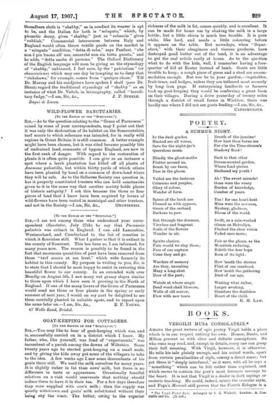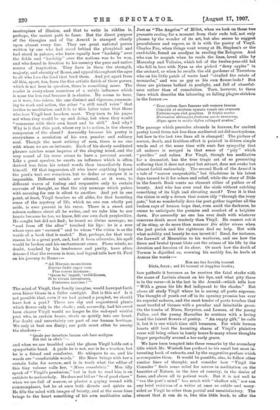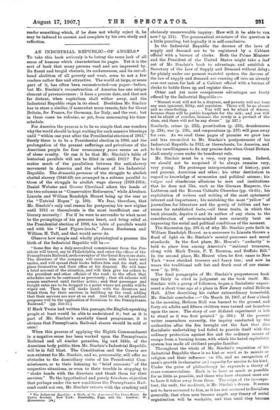BOOKS.
VERGILII MUSA CONSOLATRIX.*
AMONG the great writers of epic poetry Virgil holds a place which is in one respect entirely his own. Homer, Dante, and Milton present us with clear and definite conceptions. He who runs may read, and, except in details, every one can grasp their full meaning. With Virgil, however, it is otherwise. He tells his tale plainly enough, and his actual words, apart from certain peculiarities of style, convey a direct sense"; but yet there is "deeply interfused," as it were, with all he says a "something" which can be felt rather than explained, and which seems to contain the poet's most intimate message to the heart. It is not that Virgil is a dealer in dark sayings or esoteric teaching. He could, indeed, mimic the oracular style, and Pope's Messiah still proves that the Fourth Eclogue- is a • The Virgil Pocket-Book. Arranged by S. E. Winbolt. London: A. Con. stable and Co. Oa. list]
masterpiece of illusion, and that to write in riddles is, perhaps, the easiest path to fame. But the direct purpose of the Georgics and of the Aeneid is stamped clearly upon almost every line. They are great national poems written by one who had stood behind the ploughtail and had stood in palaces, who knew equally how "lordship" over the fields and "lordship" over the nations was to be won, and who found in devotion to his country the pure and native source of inspiration. They have in them the strength, majesty, and eternity of Rome, and appeal throughout the ages to all who love the laud that bred them. And yet apart from all this, apart. too, from the fine artistic finish of these poems, which is not here in question, there is something more. The reader is everywhere conscious of a subtle influence which is none the less real because it is elusive. lie seems to hear, as it were, two voices, the one distinct and vigorous, summon- ing to work and action, the other " a still small voice " that invites to meditation, and it is to this latter voice that those who love Virgil best hearken most. They turn to his pages not when they would be up and doing, but when they would "commune with their own heart and be still." And why ? Why is it that this poet, whose cry is to action, is the chosen companion of the closet? Assuredly because his poetry is everywhere a revelation of his own pensive and solitary soul. Though the most retiring of men, there is no one with- whom we are so intimate. Each of his slowly meditated phrases catches some impress of the shaping mind, and the very sound of his verse seems to have a personal accent. Like a great speaker, he exerts an influence which is often derived less from his actual words than immediately from himself.. Of that impression all who know anything beyond the poet's text are conscious, but to define or analyse it is impossible. Different minds are attuned, as it were to different waves of feeling and responsive only to certain currents of thought, so that the airy message which pulses with meaning for one is silent to another. And yet in one point, at least, Virgil touches us all alike, for that haunting sense of the mystery of life, which no one can wholly put aside, is ever present in his verse. There is a sweet and solemn sadness about all he writes, and we take him to our hearts because be too, we know, felt our own dark perplexities. He sought but did not find ; he heard no divine message; no "coal from off the altar" touched his lips: he is a seer whose eyes are " covered " and to whom "the vision is as the words of a book that is sealed." But, perhaps, for that very reason he is a great poet, and, had it been otherwise, his spell would be broken and his enchantment cease. Pions minds, no doubt, touched by his tenderness and purity, have often dreamed that the reverse is true, and legend tells how St. Paul on his journey to Rome :— " Ad Maronis mausoleum Ductus fudit super eum Pine rorem lacrimae : SQuem te,' inquit, reddidissem, Si to vivum invenissem, Poetarum maxime !'" The mind of Virgil, they fondly imagine, would have put forth even fairer bloom in a fuller sunlight. But is this so Is it not possible that, even if we had gained a prophet, we should have lost a poet ? There are shy and sequestered plants which flower only in the shade ; and, assuredly, had his creed been clearer Virgil would no longer be the sad-eyed wistful poet who, in certain hours, steals so quietly into our heart.
For doubt and uncertainty are part of our human heritage. We only at best see dimly; our path must often be among the shadows- " Quale per incest= lunam sub lute maligns Est iter in silvis "- and when we are troubled amid the gloom Virgil holds out a sympathetic hand. A guide he is not, nor is he a teacher, but
he is a friend and comforter. He whispers to us, and his words are " comfortable words." His Muse brings with her a . certain balm for sorrow, and is in truth what the editor of this tiny volume calls her, "Musa consolatrix." Men idly speak of " Virgil's pessimism," but in fact to read him is an antidote to melancholy. He does not bid us " be of good cheer " when we are full of sorrow, or plaster a gaping wound with commonplaces, but he at once both diverts and quiets us. He fills the mind with images of beauty, and at the same time
• brings to the heart something of his own meditative calm: •
Just ai." The Angelus" of Millet, when we look on those two peasants resting for a moment from their rude toil; not only
pleases by the wonder of its art, but also seems to suggest peacefulness and repose, so it is with the poetry of Virgil.
Charles Fox, when things went wrong at St. Stephen's or the card-table, found an anodyne in reading the Eclogues. And who can be mopish when he reads the lines, loved alike by Macaulay and Voltaire, which tell of the twelve-year-old lad who fell in love with Nysa as she picked "dewy apples" in the orchard, or when he recalls the old gardener of Tarentum who on his little patch of waste land " rivalled the estate of monarchs," and was as gay as his own flower-beds ? But these are pictures bathed in sunlight, and full of cheerful- ness rather than of consolation. Turn, however, to these lines which describe the labouring ox falling plague-stricken in the furrow:—
" Ecce autem duro fumans sub vomere taurus Concidit et mixtnm spumis vomit ore cruorem Extremosque ciet gemitus. It tristis orator Moerentem abiungens fraterna tnorte iuvencum, Atque opere in media defiza relinquit aratra."
The passage which precedes abounds in horrors, for ancient poetry loved them not less than mediaeval art did martrydoms, but how in the last two lines all is changed! The picture of sorrow, death, and fruitless effort is painted in fifteen simple words and at the same time with such fine sympathy that all sadness is merged in that sense of " pity " which " purifies " and calms. For Virgil, though too meditative for a dramatist, has the true tragic art of so presenting suffering that it does not repel but attract, does not evoke but almost forbid melancholy. The second Book of the Aeneid is a tale of " sorrow unspeakable," but Gladstone in his latest days turned to it for solace and relief, while the story of Dido in the fourth Book wants no element either of pathos or of beauty. And who has ever read the sixth without catching something of its high and elevating mood ? True it is that the vision is only a dream that comes idly "through the ivory gate," but so wonderfully does the poet gather together all the broken rays of human hope that, even amid the darkness, he seems to anticipate the promise and comfort of a brighter dawn. For assuredly no one has ever dealt with whatever concerns death more tenderly than Virgil. He cannot rob it of its sting, or do more than murmur Dis caller visum, when the just perish and the righteous find no help. But with what nobility and beauty he can invest it ! Read, for instance. the farewell of Mezentius to his warhorse, and see how the fierce and brutal tyrant blots out the crimes of his life by the devotion and heroism of its close. Or mark how the death of Tamura is dignified as, scorning his earthly foe, he hurls at Aeneas the words :— Non me tuft fervida terrent Dicta, ferox ; sed Di terrent et duppiter hostis ; how pathetic it becomes as he receives the fatal stroke with the name of Lavinia almost on his lips, and what pity there is in the verse—it is the last in the Aeneid—which tells how " With a groan his life fled indignant to the shades." But above all study Virgil where he is among all poets supreme. The thought of youth cut off in its opening promise has ever its especial sadness, and. the most tender of poets touches that most tearful of themes with a peculiar and inimitable grace. On the tombs of Nisus, Euryelus, and Lausus, of the young Pallas, and the young Marcellns he scatters with a loving hand the fairest flowers of poetry. "An empty gift," be calls it, but it is one which time still treasures. For while human hearts still beat the haunting charm of Virgil's plaintive verse will bring solace in lonely hours to many whose thoughts linger perpetually around a too early grave.
We have been tempted into these remarks by the secondary title which Mr. Winbolt has prefixed to his small but most in- teresting book of extracts, and by the suggestive preface which accompanies them. It would be possible, also, to follow other similar lines of thought, and consider how " Virgil. the Consoler" finds some relief for sorrow in meditation on the beauties of Nature, in the love of country, in the desire of fame, and above all in patient work. But it is not well to "vex the poet's mind" too much with "shallow wit," nor can any brief criticism of a Writer at once so subtle and many- sided as Virgil be other than partial and unsatisfactory. The utmost that it can do is, like this little book, to offer the reader something which, if be does not wholly reject it, he may be induced to correct and complete by his own study and reflection.




































 Previous page
Previous page